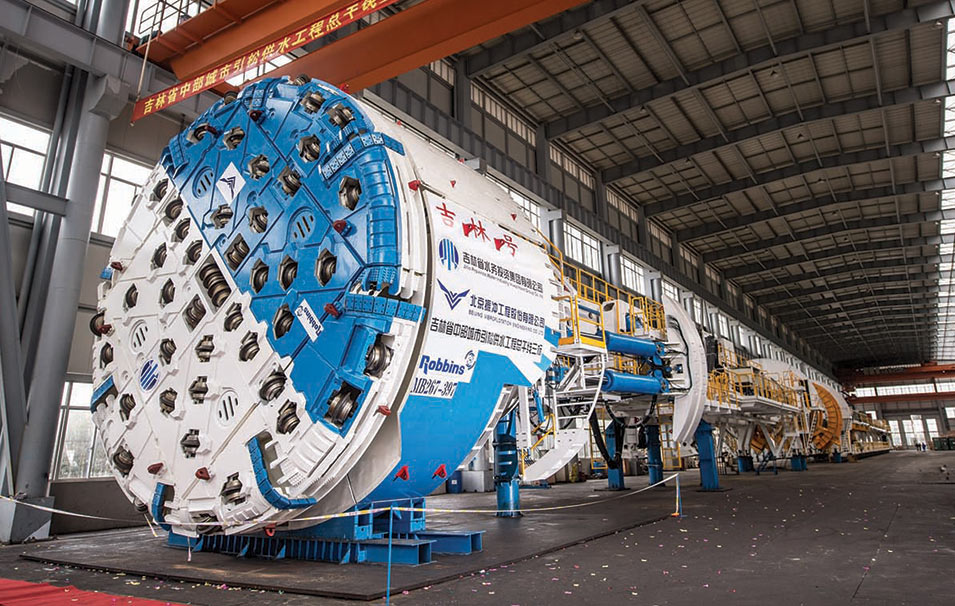Record breaking TBM performance in China 22 Feb 2018
Advance of 1,423.5m (4,670ft) in one month by a 7.9 m (26ft) diameter Robbins hard rock main beam gripper TBM in China, is claimed as a national record for machines in the 7m to 8m (23-26ft) size. The record tops a previous achievement earlier in 2017 when the TBM on the same project in Jilin Province in northeast China advanced by 1,336.8m (4,386ft) in a single month.
The world record for the same class and size at 1,482m (4,862ft) in one month is held also by a Robbins machine and was set more than 20 years ago on the TARP (Tunnel and Reservoir Plan) project in Chicago, USA. Given the differences in rock conditions, the record set at the Jilin project is considered significant. At TARP the rock was relatively homogeneous dolomitic limestone averaging 145 MPa (21,100 psi) with occasional rock bolts. At Jilin the rock types were rated from 35 to 206 MPa UCS (5,100 to 30,000 psi), and identified as tuff, granite, sandstone, and andesite with multiple fault zones and conditions that required nearly continuous ground support.
Despite the conditions, the Jilin machine has achieved an average monthly advance of 708.3m since the start of boring in March 2015. This is more than three times the average monthly rate of a drill+blast operation on another section of the project. “It is now evident that well-equipped, open-type main beam TBMs with specialized features for difficult ground can traverse faults and cope with large water inflows faster than conventional tunneling methods,” said Robbins President Lok Home. “This fact, coupled with the high performance capabilities as demonstrated at Jilin, lowers the cost and time to complete long tunnels in difficult ground.”

TBM excavated in more difficult and higher strength rock than the current class and size world record also set by a Robbins TBM
The Jilin Lot 3 tunnel, as part of a water conservation project, will be 24.3km long when complete. Being operated by contractor Beijing Vibroflotation Engineering Co (BVEC), the machine had completed 14km of the tunnel as of January 2018.
Throughout the drive, the machine is expected to traverse 24 fault zones. As a result, the TBM is designed and equipped with four rock drills, pockets in the roof shield for installation of the McNally support system slats, a ring beam erector, and a shotcrete system. The McNally system prevents movement of loose rock in the critical area immediately behind the cutterhead support. The system has been tested and proven on several projects including on the 2,000 m deep Olmos Trans-Andean Tunnel in Peru, which is the second deepest civil works tunnel in the world.
The first fault zone for the TBM in Jilin was encountered at 87m into the drive, requiring cooperation between the owner, Jilin Province Water Investment Group, contractor BVEC, and Robbins field service teams to overcome conditions. Water inflows and collapsing ground for a reach of 1,196m required a combination of McNally slats, grouting, and consolidation of the ground ahead of the machine. Ground support overall consists of wire mesh and shotcrete. Tunnel reflection tomography (TRT), a method of ground prediction using seismic waves, is also being used to detect changing conditions ahead of the TBM.
Despite the initial challenges, the TBM is now advancing at between 40m and 60m/day. “All components of the TBM system are working well during operation, which has ensured our good progress,” said by Tao Yong, BVEC Jilin Lot 3 TBM Site Manager.
The Jilin Yinsong Water Supply Project will will divert water from the Fengman Reservoir at the upper reaches of Di’er Songhua River to central regions of Jilin Province that are experiencing chronic water shortages. The large-scale, trans-regional water diversion project is the longest water supply line in the history of Jilin Province, measuring 263.5km, and with the largest number of benefiting recipients in several cities, including Changchun and Siping, eight surrounding counties, and 26 villages and towns under their jurisdiction.
Tunneling is expected to be complete in late 2018.
References
- TBM excavation conquers Peruvian Andes – TunnelTalk, January 2012
- Modern large diameter rock tunnels – TunnelTalk, April 2010
|
|
|
|
|
Add your comment
- Thank you for taking the time to share your thoughts and comments. You share in the wider tunnelling community, so please keep your comments smart and civil. Don't attack other readers personally, and keep your language professional.


